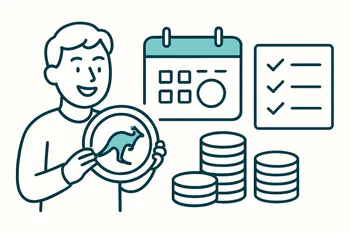Understanding Self Employed Business Loans in Australia
- Personal Finance
- 04 Mins read

Understanding Self Employed Business Loans in Australia
Navigating the world of self employed business loans in Australia can feel overwhelming. However, with the right knowledge and strategies, securing funding can be a straightforward process. This guide aims to clarify everything from eligibility requirements to the application process and provide tips for a successful loan experience.
What are Self Employed Business Loans?
Self employed business loans are financial products designed specifically for individuals who run their own businesses. Unlike traditional employment, self employed individuals often face unique challenges when seeking financing. This is mainly due to fluctuating income and the different ways they demonstrate their financial reliability.
Who is Considered Self Employed?
In Australia, you are classified as self employed if you operate your own business, hold an Australian Business Number (ABN), and report taxable income from that business. Freelancers, sole traders, and owners of small or medium enterprises (SMEs) all fall into this category.
Eligibility for Self Employed Business Loans
Before applying for a loan, it’s crucial to understand the eligibility requirements. While these can vary by lender, common criteria include:
- ABN Registration: Proof that you have been operating your business for at least 12 months.
- Financial Statements: Recent personal and business financial statements, including profit and loss statements.
- Credit History: A good credit score is essential. Lenders will check your credit history to assess your reliability.
- Debt-to-Income Ratio: Lenders will look at your overall debts compared to your income to determine your ability to repay the loan.
Tip: Keep your financial documents organized. It speeds up the application process and can improve your chances of approval.
Types of Self Employed Business Loans
Understanding the different types of loans available can help you choose the one that best fits your needs. Here are the primary options:
1. Secured Loans
Secured loans require you to put up an asset, such as property or equipment, as collateral. If you fail to meet the repayment terms, the lender can seize the asset. However, these loans often come with lower interest rates because they are less risky for lenders.
2. Unsecured Loans
Unsecured loans don’t require collateral. Instead, lenders rely heavily on your creditworthiness and financial history. While these loans may provide quicker access to funds, they often come with higher interest rates.
3. Lines of Credit
A line of credit provides flexible access to funds up to a certain limit. You can borrow as needed and only pay interest on the amount used. This option is particularly helpful for managing cash flow or funding short-term expenses.
4. Business Overdrafts
A business overdraft allows you to withdraw more money than what is available in your account, up to an agreed limit. Interest is charged only on the overdrawn amount.
The Application Process
Applying for a self employed business loan involves several key steps. Understanding each step can make the process smoother:
1. Assess Your Financial Needs
Start by determining how much money you need and what you will use it for. This clarity will not only help with your loan application but will also keep you focused.
2. Gather Necessary Documentation
As mentioned earlier, you’ll typically need:
- Recent financial statements
- Tax returns
- Business plans
- Personal identification
Quote: "Preparation is the key to success. Having your documents in order can make the difference between a quick approval and a lengthy process." - Your Friendly Mortgage Broker
3. Research Lenders
Compare different lenders to find the best interest rates and terms. Look for reviews and feedback from other self employed borrowers.
4. Submit Your Application
Once you’ve chosen a lender, submit your application along with your supporting documents. This may be done online or in-person, depending on the lender.
5. Wait for Approval
After submission, the lender will review your application. This may take days or weeks, depending on their process.
6. Receive Your Funds
Upon approval, you can expect to receive your funds within a few working days. Ensure you understand repayment terms before accepting.
Tips for Securing Funding
Securing a loan is often competitive. Here are some tips to increase your chances:
Maintain Good Credit: Keep your credit score healthy by paying your bills on time and reducing debt.
Provide Comprehensive Financials: Be transparent and provide as much information as possible to build trust.
Create a Strong Business Plan: A well-thought-out business plan shows lenders that you have a clear strategy for success.
Seek Professional Advice: Consider consulting with a financial advisor or mortgage broker to guide you through the process.
Common Questions and Concerns
What If I Have Bad Credit?
Having a poor credit history doesn’t automatically disqualify you from getting a loan. Some lenders specialize in working with borrowers with low credit scores. However, be prepared for higher interest rates. Consider improving your credit before applying if possible.
Can I Use a Personal Loan for Business Expenses?
Yes, you can use a personal loan for business purposes. However, keep in mind that this may complicate your personal financial situation and could impact your personal credit score as well.
How Much Can I Borrow?
The amount you can borrow typically depends on your income, the lender’s policies, and whether you’re applying for a secured or unsecured loan. Lenders may offer amounts ranging from a few thousand dollars to millions.
Conclusion
Understanding self employed business loans in Australia is essential for any entrepreneur looking to grow their business. By recognizing your eligibility, types of loans, and the application process, you can navigate this landscape confidently. Remember to prepare your documentation, research lenders, and seek professional advice when needed.
With the right approach, securing funding for your business can become a positive and empowering experience. Whether you are just starting out or looking to expand, there are financing options available to help you achieve your goals.



